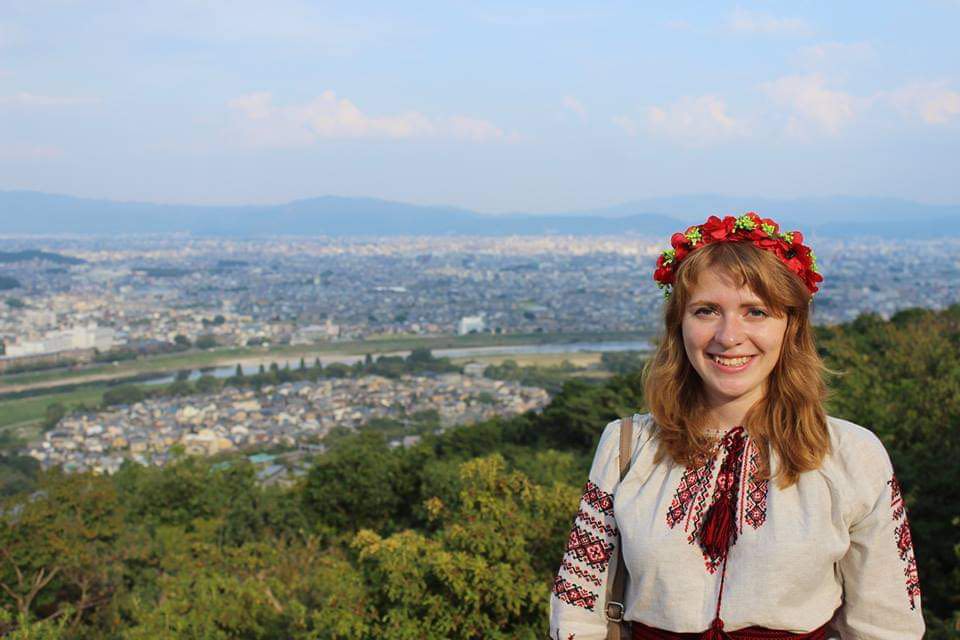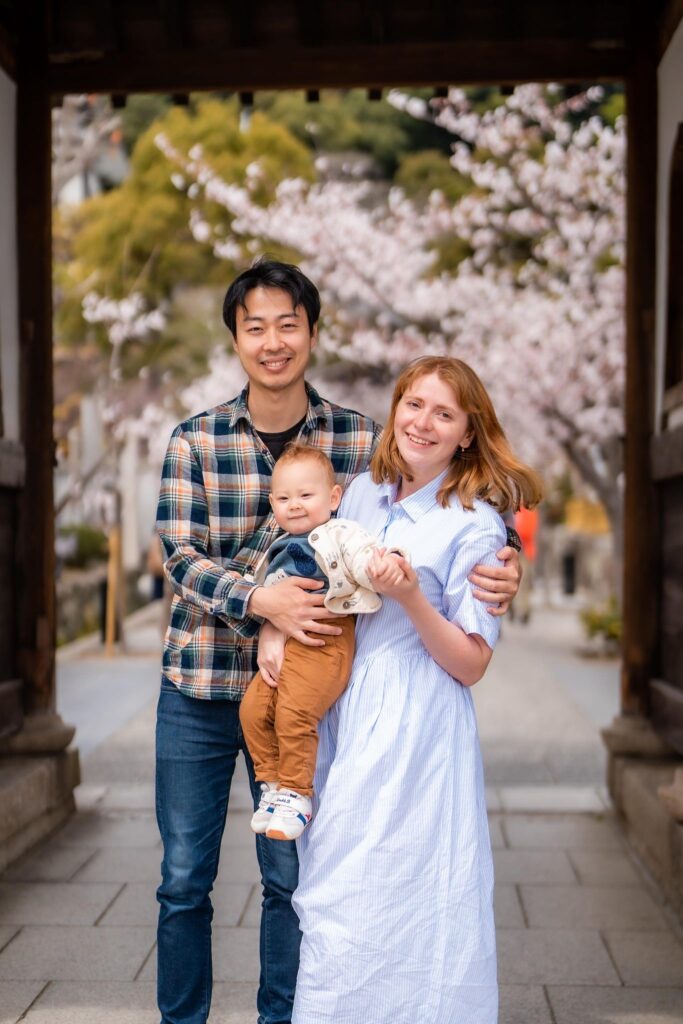As summer winds down and autumn gradually brings refreshingly cooler weather to Kyoto, let us settle in to read another prizewinning submission from the Writers in Kyoto Seventh Annual Writing Competition.
Ukrainian-born Tetiana Korchuk’s “The Promise” was selected as the winner of our Unohana Prize, awarded to the national of a country in which English is not an official language. Her heartwarming piece, a true story, was chosen by the judges for its skillful depiction of the onset of love and a vision of the future. “The Promise” also illustrates the setting of the Kamo River as a gathering place for locals and lovers. The young couple joins this parade in the cycle of time. Expressions of affection, however, continue to evolve throughout the generations.
* * *
The Promise
It has happened in our early dating days, when you still can’t quite wrap your head around the thought that feelings are actually mutual. You feel drunk with love, almost feverish from every single thing going on in your head. Everything around you seems magical, full of hidden meaning and perfectly imperfect. Everyday is almost like the night before Christmas, when the next day should be even happier than today, and you are ready to experience that happiness with every tiny cell of your body.
I was waiting for him at the Keihan station, our usual meeting spot, just to walk alongside Kamogawa river, like many times before. At university class we recently started studying The Tale of Genji, and my thoughts were wandering, trying to imagine Kyoto of those times. For just a moment I felt like I could see it, petite young ladies in kimono, fishermen in large straw hats, black-haired, tanned children running around barefoot. Children’s laughter sounded almost like a melody of colorful wind chimes, hanging near entrances of the riverside houses. I could even smell freshly cooked food, probably made by a mother waiting for her family to gather for dinner and felt the taste of tart green tea on my tongue.
That moment I spotted him finally approaching, tall and easily noticeable among others. My heart skipped a bit, and I immediately was brought back to reality. We held hands and started slowly walking our usual route, talking about everything and observing other couples sitting close to each other facing the river. Someone was practicing saxophone under one of the bridges, housewives were walking their cute fluffy shiba dogs with round tails. As evening approached, groups of young people with music and drinks started gathering here and there. Near the station performers were advertising a fire show starting in a few minutes.
Suddenly I saw a nicely dressed elderly couple walking towards us in a traditional Japanese manner, the wife just two steps behind her husband’s back. They were smiling and talking quietly.
“Would we also be walking here when we are in our seventies, what do you think?” asked I. Immediately feeling a little nervous, like if my life depended on his answer.
“Sure, I can promise you that,” he said. “But we will also be holding hands.” He was smiling only with his dark eyes.
My heart was full. Full of love to that elderly couple, the slow waters of Kamogawa, and cute shiba dogs. Full of love to him.
* * *
Tetiana Korchuk is a translator, teacher, and author born and raised in Kyiv, Ukraine. She first arrived in Japan in 2014 as an exchange program participant. After graduating from Taras Shevchenko National University of Kyiv with a major in Japanese Language and Literature, she moved to Japan permanently in 2017. She now resides in Kobe, Hyogo Prefecture and enjoys learning about traditional Japanese culture, writing short stories, and cuddling with her shiba dog named Sakura.
Writers in Kyoto stands in solidarity with the people of Ukraine during this very challenging time in their country’s history, and therefore we asked Tetiana if she would like to write more about her connection with Kyoto and her feelings about the current situation in Ukraine. She writes:
“I first came to Kyoto in September 2014, a proud and excited exchange student, who finally managed to make her dream of visiting Japan into reality. My luggage was lost on the way (though found and returned to me safely after a couple of days), so I started my new life almost empty-handed. My first night, wandering the streets around the dorm where I was staying, I was feeling happy and confused, but mostly stunned by the city.
Eight years have passed since then, and now I live in another place, but still close enough to visit often. Years spent in Kyoto — first as a student, and later living and working there — has helped me to create a bond with the ancient Japanese capital. Now, arriving at Kyoto Station with its modern design, view of Kyoto Tower, and people going up and down on a cascade of escalators, always feels a bit like home.
Why is Kyoto so special to me? I don’t know. Maybe because I totally adore its history, shrines and temples, festivals and crafts. I enjoy that it is full of surprises and hidden treasures which you can’t find in tourist guidebooks. Maybe it’s because several of the busiest and most adventurous years of my life were spent there.
It also happens that among all Japanese cities, Kyoto is also special to me for one more reason. Actually, in 1971 Kyoto established a sister city relationship with Kyiv, the city where I am originally from and where my family still lives. These two beautiful cities have more in common than is apparent at first sight. Both are ancient capitals with an amazing history, culture, and proud people. Nowadays one of the parks in Kyiv is called ‘Park Kyoto’, which has a beautiful alley of Japanese cherry trees. My heart goes to Kyiv right now, and I also think about the festive blooming of the city’s chestnut trees.
Since the Russian invasion started on February 24th, Kyiv is not the peaceful, gorgeous city I used to know. It is not safe anymore, and many other places aren’t either. My heart hurts thinking about people who lost their homes due to this war. People who lost their loved ones. People who lost their lives. I can’t stop thinking about schools, kindergartens, and hospitals being shelled. Children being killed.
Being an emigrated Ukrainian these days is not easy, constantly being worried about family and friends and not being able to help much. Therefore, I’m forever grateful for all of the support that the people of Kyoto and other Japanese cities have shown to Ukrainians during these hard times — organizing charity events, peaceful demonstrations, accepting refugees, and much more. I feel that Ukrainians are not alone right now. We pray together for peace, and I believe that peace will come soon.”


